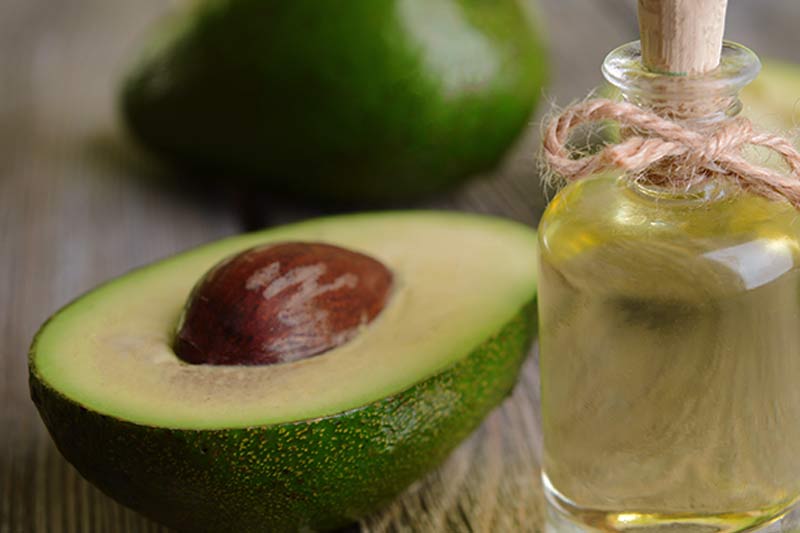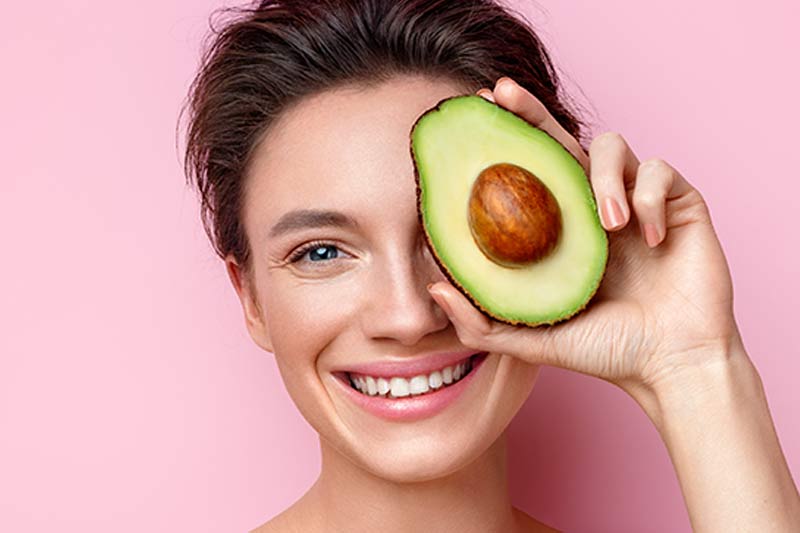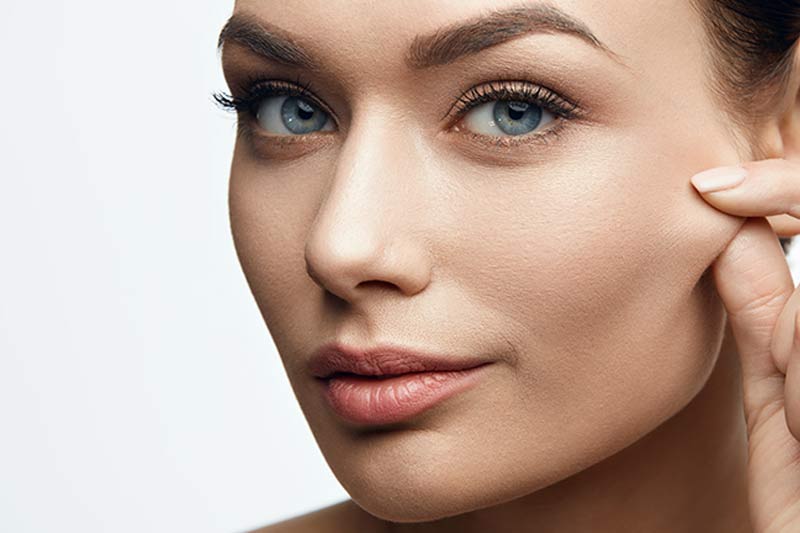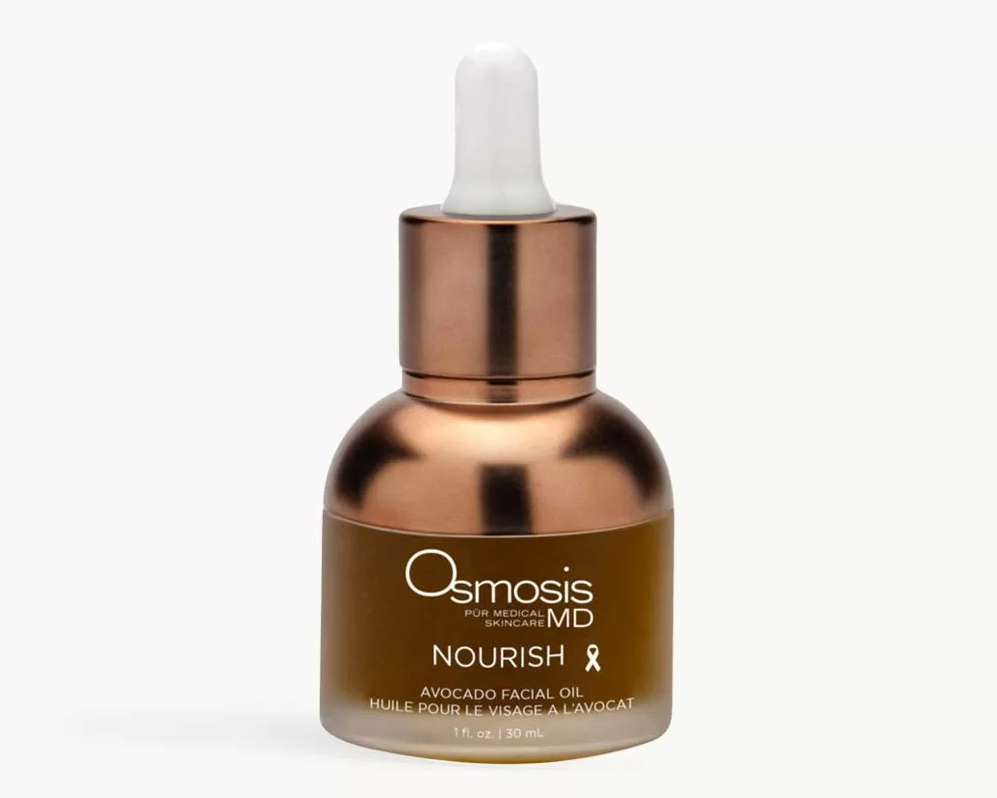Avocado is a fruit dense with nutrients, including omega-3 fats, fiber, minerals like potassium and magnesium, and vitamins B, C, E, and K. They give avocado its healthful properties, making it a standard item in meal plans for cardiovascular patients, people with diabetes, and people struggling to lose weight.
Primarily known for its healthy fats that improve heart health, avocado has other beneficial uses. For example, the beauty industry recognizes ability of avocados to deeply hydrate, strengthen, and repair the skin.
This article lists 12 avocado benefits for the skin and explains how to use it to achieve a glowing, rejuvenated complexion.

12 Avocado Benefits for Skin
This extensive list of avocado’s benefits for the skin reminds us that many rejuvenation solutions are cost-effective and available as a DIY treatment. They only require dedication.
Here is what avocado can do for our complexion.
1. Intensely Hydrates the Skin
An avocado is predominantly made up of omega-3 and omega-6 fatty acids. They create a film on the skin’s surface to increase water retention, keeping the skin supple and well-hydrated. Vitamins C and E present in the fruit also have a highly moisturizing effect, making the avocado a natural solution to dry skin and resulting skin conditions.
2. Protects from Free Radicals

Free radicals are unstable molecules often caused by pollution, alcohol, and other external factors. They lead to oxidative damage, which destroys skin cells and results in aging signs and poor skin health. Avocado is packed with antioxidants, such as vitamins C, E, B, carotenoids lutein and beta-carotene, and phytochemicals. They neutralize free radicals, reducing skin damage.
Note: Learn about the best antioxidants in skin care and how they improve skin health.
3. Reduces Inflammation
Skin inflammation leads to various skin problems, including redness, dry skin, wrinkles, and acne. Omega-3 fats in avocado have potent anti-inflammatory properties, while antioxidants help reduce oxidative damage that leads to inflammation.
4. Strengthens the Skin Barrier
Lipids, antioxidants, and anti-inflammatory agents in avocado hydrate the skin and protect it from damaging factors, helping to build a stronger skin barrier. A healthy protective skin barrier prevents transepidermal water loss and premature aging signs.
5. Alleviates Sun Damage
UV rays are the most damaging of all skin aging factors. They accelerate the breakdown of collagen, the primary skin-building protein, and damage the skin cell DNA. Vitamins E and B3, carotenoids, and omega fatty acids in avocado help to soothe and repair the skin from the damage caused by UV radiation. Vitamin C also helps build more collagen.
Note: Learn about the role of collagen in skin and how to stimulate its production.
6. Helps Decrease Aging Signs
Many internal and external factors degrade collagen and elastin, causing dehydration, loss of skin elasticity, the appearance of wrinkles and hyperpigmentation, etc. Avocado is a powerful aid in decreasing these aging signs. Key anti-aging ingredients in avocado include:
- Vitamin C – Helps build collagen to maintain the skin’s suppleness and reduce wrinkles.
- Vitamin E – Protects the skin from oxidative stress, especially when paired with vitamin C.
- Omega fatty acids – Prevent water loss and keep the skin hydrated.
- Vitamin B3 (niacinamide) – Helps retain moisture, reduces hyperpigmentation, and strengthens the natural skin barrier.
- Carotenoids (lutein and zeaxanthin) – Exhibit UV-filtering effects and neutralize free radicals.
7. Increases Elasticity

A recent study showed avocado consumption and topical application help increase skin elasticity and firmness. The fruit contains a superior combination of phytochemicals, such as carotenoids and vitamins. These stimulate elastin production and alleviate the consequences of repeated skin stretching.
8. Reduces Dark Spots
Avocado contains vitamin C, a skin-brightening agent, and niacinamide, one of the most effective ingredients for uneven, hyperpigmented skin. Its antioxidant and UV-filtering ingredients also minimize sun damage, which contributes to the formation of dark spots.
Note: Read about the best products and treatments for dark spots on the face.
9. Helps with Psoriasis and Eczema
Psoriasis and eczema are widespread skin conditions with a host of uncomfortable symptoms, such as dryness, itching, redness, and cracked skin. The high lipid content in avocado helps soothe inflamed skin, while antioxidants protect the cells from oxidative stress and reduce the risk of inflammation.
10. Removes Dead Skin Cells
A buildup of dead skin cells results in dry, problematic skin. Antioxidants and minerals in avocado make it an effective exfoliating agent. They help remove dead cells and unclog pores without drying the skin out.
11. May Reduce Acne Breakouts

Because of its exfoliating and hydrating properties, avocado may be beneficial in clearing the skin and preventing acne breakouts. At the same time, the high lipid content makes avocado comedogenic (pore-clogging).
In summary, avocados can help some acne patients but exacerbate acne in others. Consult your skincare provider about the best product and treatment for your acne type.
Note: If you struggle with acne and want to avoid synthetic products and medications, try these gentle holistic acne treatments.
12. Improves Overall Skin Health
The state of our skin depends on various factors: its moisture level, the integrity of its barrier, collagen and elastin reserves, cell turnover, lifestyle habits, etc. Maintaining its health requires a cumulative approach, including a dedicated skincare routine and a balanced diet. Avocado has proven beneficial both as a topical and a nutritional source of skin-enhancing ingredients.
How to Use Avocado for Skin?
Studies have shown that avocado applied topically and consumed can help enhance skin elasticity, reduce UV-induced photoaging, and improve skin health.
There is no standard dosage and doctors generally recommend eating up to one whole avocado daily for overall health, including the skin. As for skin care, you can use store-bought products with avocado or DIY face masks and creams.
Avocado Facial Oils
Avocado oil has a slightly different nutritional profile than avocados, but provides the same benefits and is easily applied. Our skin experts at Vibrant Skin Bar recommend cold-pressed, organic Avocado Facial Oil by Osmosis MD Nourish because its superior formulation and lush texture help to infuse the skin with long-lasting moisture.

Avocado oil can be used as a moisturizer, a spot treatment for inflamed patches of skin, or as a makeup remover. You can also mix it with kitchen staples, such as Greek yogurt, honey, and lemon, to make a hydrating, nutritious face mask.
Avocado Face Mask Recipes
These two recipes will come in handy when you need a quick recovery after a poor night’s sleep or you want to glow for a special occasion.
Avocado Face Mask for Even Skin Tone
Cut the avocado in half, remove the flesh, and place in a bowl. Add two tablespoons of organic honey. Add two teaspoons of squeezed lemon. Mash the ingredients into a smooth paste and apply on a cleansed face. Leave on for 20-25 minutes, then rinse with lukewarm water. You can store the mask in a glass jar in the fridge for five days.
Avocado Face Mask for Glowing Skin
Mix and mash half of an avocado, half a banana, and the juice of half a lemon. Add one tablespoon of pure honey. Use a blender if you don’t want lumps. Apply on cleansed skin and leave on for 30 minutes, then rinse off.
Conclusion
Avocados are a nutritional powerhouse, often included in medical patients’ diet plans to improve their health. The fruit has also gained recognition in cosmetics for its skin-enhancing properties. Avocado benefits for the skin range from intense hydration and greater firmness to a reduction of inflammation symptoms.
Consult a medical professional before introducing new products to your routine. For product recommendations and usage advice, or to book a free consultation, contact Vibrant Skin Bar today.


